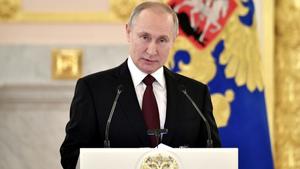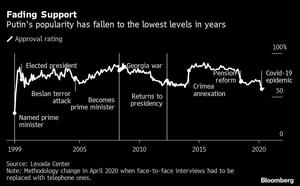 Russian President Vladimir Putin attends a ceremony to receive credentials from newly appointed foreign ambassadors to Russia at the Kremlin in Moscow on Feb 5, 2020. (ALEXEY NIKOLSKY / SPUTNIK / AFP)
Russian President Vladimir Putin attends a ceremony to receive credentials from newly appointed foreign ambassadors to Russia at the Kremlin in Moscow on Feb 5, 2020. (ALEXEY NIKOLSKY / SPUTNIK / AFP)
Russian President Vladimir Putin is on course to secure a resounding endorsement of his bid to extend his two-decade-long rule potentially up to 2036, as the Kremlin faces criticism for its heavy-handed efforts to marshal support.
The Russian leader has proposed a revised constitution that would give him the right to run for two more six-year terms after his current mandate runs out in 2024
Putin, a former KGB colonel who came to power in 2000, is already the longest-serving Russian leader since Soviet dictator Josef Stalin. The Russian leader has proposed a revised constitution that would give him the right to run for two more six-year terms after his current mandate runs out in 2024.
ALSO READ: Vote on Russia's constitutional amendments begins
“We are voting for the country that we’re working for and that we want to hand down to our children and grandchildren,” Putin told Russians in a televised address Tuesday. Voting began last week and an exit poll by state-run Vtsiom released Monday put support for the amendments at 76 percent. Turnout has already reached 46 percent, according to the Central Election Commission.
Amid rising public discontent, officials have been pulling out all the stops to ensure a high turnout and resounding approval in a vote Putin wasn’t obliged to call. They’ve wooed Russians with populist sweeteners such as an effective constitutional ban on gay marriage, along with raffles for voters, while blocking any campaigning against a ‘yes’ vote.
Mandate Sought
While a simple majority in favor and a turnout exceeding 50 percent of eligible voters is all that’s required, the Kremlin will be satisfied only with an overwhelming endorsement of more than 70 percent on both measures, according to Alexei Mukhin, head of the Moscow-based Center for Political Information.
Putin, 67, is confronting a slump in his approval ratings as Russia’s economy reels under the impact of the coronavirus epidemic and a collapse in oil prices. Once the referendum is out of the way, the Russian president will face the task of navigating through one of the deepest recessions of his time in office.
ALSO READ: Russian parliament passes bill on constitutional amendments
“This is the most serious challenge the system has faced under Putin,” said Nikolai Petrov, a fellow at London-based Chatham House think tank. Putin’s future depends no longer on his past achievements but on how well he succeeds in getting Russia out of the current crisis, he said.
Putin caught even many in his inner circle by surprise in January when he announced plans to carry out the most extensive reform of the constitution since it was adopted in 1993. However, the clause allowing him to sidestep term limits didn’t appear until March, even if some officials later suspected that had been his plan all along.

Putin’s popularity rating at 60 percent -- though still respectable by western standards -- is around the lowest levels since he became president in 2000, according to the Levada Center, an independent pollster in Moscow.
Fading Support
After years of stagnation, Russia’s economy may shrink by 6.6 percent this year, the worst contraction since 2009 in the wake of the global financial crisis, according to the International Monetary Fund. Real incomes are falling, while unemployment climbed to 6.1 percent in May from 4.7 percent in March.
Putin, 67, is confronting a slump in his approval ratings as Russia’s economy reels under the impact of the coronavirus epidemic and a collapse in oil prices. Once the referendum is out of the way, the Russian president will face the task of navigating through one of the deepest recessions of his time in office
Putin sought to win over ordinary Russians on the eve of the vote by unveiling fresh cash payments for families and the unemployed and a tax increase for the rich.
READ MORE: Putin announces constitutional reform, names new PM
At the same time, he’s sought to demoralize the opposition by openly indicating he’ll run again for president in 2024 and through a renewed crackdown on critics, said Mikhail Vinogradov, head of the St. Petersburg Politics Foundation.
Levada’s latest poll conducted late May showed fewer than half of people support the constitutional reform. State employees are being pressured into voting, according to election monitoring group Golos, which said that the use of large-scale online voting for the first time and the week-long balloting process made it harder for independent observers to uncover any violations.
“The way this vote is conducted does not meet either Russian constitutional or international standards of expression of will,” Golos said in a report Tuesday. Multiple violations, including ballot stuffing, abuse of authority, illegal campaigning and forcing citizens to vote were detected during the early vote June 25-30, Golos said, calling the high turnout “abnormal.”
READ MORE: Russia's Putin registers re-election bid
Kremlin officials said any violations would be investigated but aren’t widespread enough to cast doubt on the legitimacy of the vote.
After the referendum, “everyone’s anger will be directed against the government,” said Olga Kryshtanovskaya, a sociologist who studies the elite at the State University of Management in Moscow. “People have a lot of complaints.”


